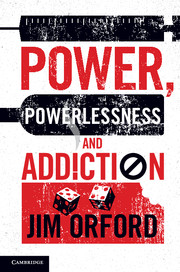Book contents
- Frontmatter
- Dedication
- Contents
- Preface
- Acknowledgements
- 1 Powerful connections
- 2 How addiction erodes free agency
- 3 Addiction subordinates the interests of family members and friends
- 4 Inequality in the power to resist addiction
- 5 Power and powerlessness in the addiction supply industries
- 6 Reasserting control and power in the process of change and treatment
- 7 Facing up to the power of addiction and those who benefit from it
- References
- Index
4 - Inequality in the power to resist addiction
Published online by Cambridge University Press: 05 July 2013
- Frontmatter
- Dedication
- Contents
- Preface
- Acknowledgements
- 1 Powerful connections
- 2 How addiction erodes free agency
- 3 Addiction subordinates the interests of family members and friends
- 4 Inequality in the power to resist addiction
- 5 Power and powerlessness in the addiction supply industries
- 6 Reasserting control and power in the process of change and treatment
- 7 Facing up to the power of addiction and those who benefit from it
- References
- Index
Summary
The argument of Chapters 2 and 3 was that addiction is best thought of as an external source of power which undermines the capacity of the consumer for autonomous action (Chapter 2) and which, from thence, erodes the control which other members of the family, as well as close friends and colleagues, have over their lives (Chapter 3). But that says nothing about already existing power differences: it implies that addiction strikes randomly irrespective of people's power to resist. In this chapter it will argued that, far from showing such a disinterest in the structure of power, addiction flourishes where power to resist is already weakened. The argument will draw on a wide range of research evidence, derived from different traditions, some of it epidemiological and statistical in kind and in other instances of a qualitative and ethnographic sort. It engages us in examining the influence of power differentials by social class, gender, ethnicity and sexual orientation. It requires us to focus on individuals, their households and the neighbourhoods and areas in which they live. It forces us to consider the weight of the political and economic history and current context in which addiction can thrive. It raises the question of the extent to which free will and the exercise of autonomy are possible in resisting addiction in the face of structural forces of which those who suffer from addiction may be scarcely aware.
- Type
- Chapter
- Information
- Power, Powerlessness and Addiction , pp. 98 - 130Publisher: Cambridge University PressPrint publication year: 2013



